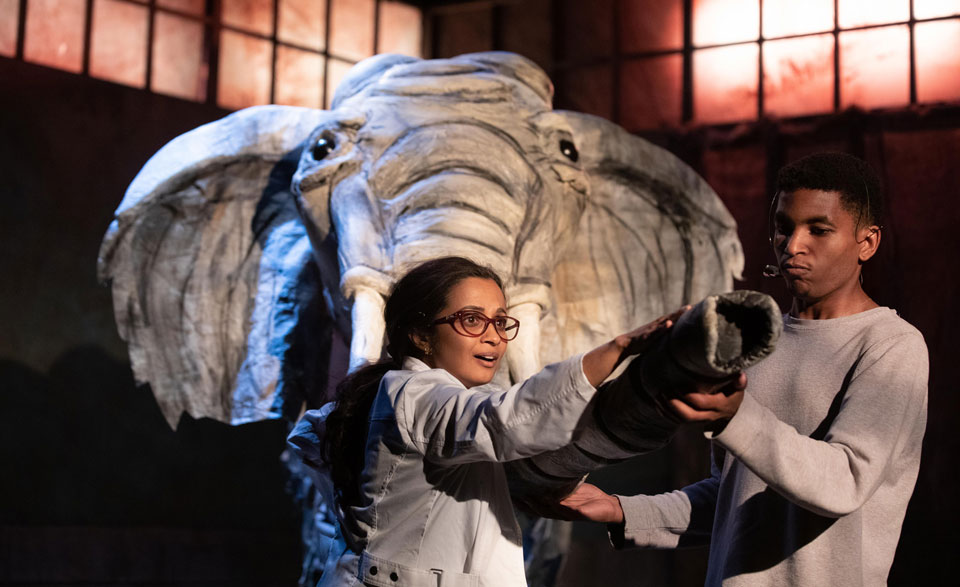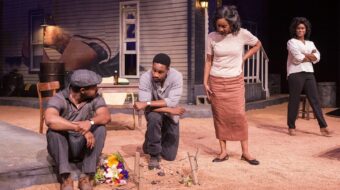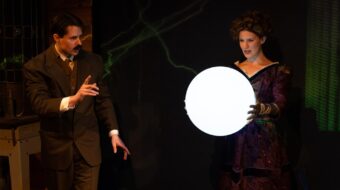
VENICE, Calif.—In lesser hands, Rogue Machine Theatre’s production of Bekah Brunstetter’s Miss Lilly Gets Boned could have been a conventional crowd-pleasing rom-com. Instead, this one-act play veers wildly off the tried and true primrose path into uncharted territory which hasn’t been explored much on the boards since Eugene Ionesco’s 1959 Rhinoceros. (Interestingly, Rogue’s co-artistic director, Guillermo Cienfuegos, helmed an unforgettable version of Ionesco’s play in 2017 at Pacific Resident Theatre, which like Rogue’s current venue is also in Venice.)
The plot, with cute meet and all, unfolds at a mid-sized town in somewhere-ville USA, where the 35-year-old virginal title character (Larisa Oleynik) holds forth with homilies at a Baptist bible study class or Sunday school. Miss Lilly’s simplistic grasp of the Old Testament is easily contested by traumatized 12-year-old Jordan (Brady Amaya, a rising star of stage, screen, and dance).
When the new boy in town’s father arrives to pick Jordan up, sparks instantly fly between Miss Lilly and the portentously named Dick—or Richard, as he’s called, so as not to allude to male genitalia (Iman Nazemzadeh, aka Ethan Rains). The naïve, narrow-minded Miss Lilly is swept off her feet by Dick—uh, Richard’s—English accent, although Nazemzadeh was actually born in Iran. (It was unclear to me whether or not the character of Richard was meant to be of specifically Anglo-Saxon heritage, but in any case, as the English archaeologist, Nazemzadeh excels with a penetrating performance.)
The other character in the America-set portion of Boned is Miss Lilly’s “slutty” younger sister, a lapsed Baptist and cycling fitness instructor impishly played by Ovation Award winner Tasha Ames.
However, it is the characters on the other side of the world who are startling and provide the back story to Jordan’s trauma and his sudden appearance in America. Without giving too much away, “Harold” (Justice Quinn provides his voice) is a rogue elephant whom the scientist, doctor or trainer Vandalla Bhalla (the sultry Kavi Ladnier, whose features Boris and the Bomb and LBEM opposite Constance Wu are upcoming) is desperately trying to redeem and save. The pachyderm puppetry of Rachael Caselli, Amir Levi, and Sean Cawelti are a highlight of Boned and also enhance the weirdness and otherworldly ambiance of this increasingly surreal play.
This sensibility is further amplified by Michelle Hanzelova’s graphic and projection design and Mark Royston’s shadow puppet design within a stained glass window motif, which comment upon and illustrate Brunstetter’s ever more absurdist story. Stephanie Kerley Schwartz’s scenic design made the Electric Lodge’s stage and seats unrecognizable to this frequent wayfarer to this Venetian theatrical outpost, and also organically contributed to the onstage action. At times, the mise en scène had the stage equivalent of a movie’s split-screen effect (Brunstetter also uses the cinematic technique of a flashback to tell her tale).
The intertwining of the African and American storylines is deftly done and heightens the exceptional nature of this play, which wantonly disregards and undermines those time-honored Aristotelian unities of action, time and place. As the story progresses (probably not accidentally, along with Miss Lilly’s growing sexuality), Boned departs more and more from the literal and representational to the realm of the senses and symbolic.
The titular “bone,” for example, is actually a double—or even a triple?—entendre with multiple meanings, even as the word “boner” (which I don’t recall being used per se in this play) has more than one definition. The absurdity of Boned extends to religious fundamentalism—which is “mental” because it stifles “fun.” The name of Richard’s son, “Jordan,” has Old Testament and Gospel implications. In her critique of bible-thumping’s anti-humping stipulations (despite all of the good book’s “begat-ing”), Brunstetter is unsparing in portraying Christian zealotry as being a form of simpleminded idiocy, if not outright lunacy.
The rampaging rogue elephants may even be a reference to the GOP since by the 1870s cartoonist Thomas Nast caricatured and represented Republicans as those powerful, tusked, long-eared creatures. Certainly, today’s Trumpian party is like an elephant stampede, stomping out human and constitutional rights.
(This dramedy also reminded me of one of the grimmest stories I ever reported on, about Tyke, a circus elephant who ran amok near downtown Honolulu in the 1990s, trampling bystanders to death, which was finally felled by bullets fired by Five-O.)
Boned’s high caliber cast and crew are full of award winners, epitomized by director Robin Larsen, whose first film Sombra scored a Student Academy Award in 1998; in 2015, she won an L.A. Drama Critics Circle Award for Career Achievement in Direction. Larsen adroitly oversees Boned’s Julie Taymor-like bold visualizations and well-acted ensemble. Of course, Rogue Machine Theatre is no slouch in the prize department either, winning the 2017 Ovation Award for Best Season, beating out much larger thee-a-tuhs with presumably far greater resources.
To be sure, this West Coast premiere of Boned is in keeping with Rogue’s high artistic standards, which “seeks to be a theatre of ideas and imagination, a theatre which mirrors and examines contemporary culture, a theatre which nurtures contemporary playwrights, and a theatre whose work continually engages the community and creates a dialogue which resonates after the curtain closes,” according to the company’s lofty mission statement.

Boned possesses one of those things I value most in the arts—originality—and is indeed an exceedingly audacious, unique and imaginative production that is always entertaining, brought alive by a creative team of humans and puppets. I was unable to guess to what direction the story and characters were moving. But Boned arguably is missing another of the essential ingredients for great art—an uplifting perspective. Brunstetter’s bleak point of view may express and comment upon the human condition but holds little if any hope for us mere mortals. The playwright’s musings on human and animal nature are pretty somber. Ironically, it is the child Jordan who verbalizes this despair best early on in this play performed without intermission.
Of course, this is in line with existentialist and other types of dramas and comedies. Yet despite this omission Boned is must-see, essential theatergoing that is for adventurous ticket buyers who enjoy being challenged, amazed and who, well, aren’t boneheads. But leave the kiddies at home as this highly recommended work of art deals with serious, and absurd adult subject matter.
Rogue Machine Theatre’s production of Miss Lilly Gets Boned plays Mon., Fri. and Sat. at 8:00 p.m. and Sun. at 3:00 p.m. through October 28 at the Electric Lodge, 1416 Electric Ave., Venice 90291. (Note: The Sat., Sept. 28 performance will be a 2:00 p.m. matinee, with no performance on Sun., Sept. 29.) For ticket info: (855) 585-5185 or the company website.
(Kavi Ladnier acts in Boris and the Bomb: A Nuclear Fairy Tale, which she also produced. It opens this weekend at the Laemmle NoHo 7.)
Rampell is moderating the “Enter Stage Left: Theater, Film and TV for a Better World” panel at the Left Coast Forum on Oct. 13.












Comments